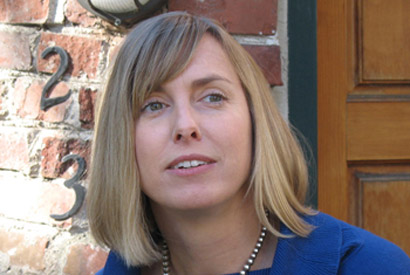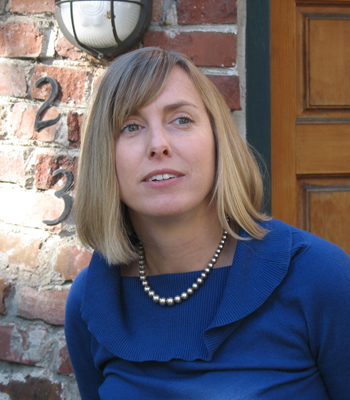When the going gets tough, she’d rather be ombudsing
Sara Thacker gave up a successful career as a litigator for a more informal — and, she believes, more effective — approach to resolving conflicts. Now, as director of the Staff Ombuds Office, she aims to create a safe place for Berkeley staff and non-Senate faculty to work out their issues with managers, colleagues and, in some cases, the changing nature of their jobs themselves.

November 20, 2012
“Persons of Interest” is a weekly series exploring the lives of students, staff and faculty, both on- and off-campus.
 BERKELEY — One of Sara Thacker’s “proudest moments as an ombudsperson” — and one of the few she’s at liberty to talk about — occurred not in the quaint Hobbit-hutch cottage that houses UC Berkeley’s Staff Ombuds Office, but on the upper deck of the Bay Bridge.
BERKELEY — One of Sara Thacker’s “proudest moments as an ombudsperson” — and one of the few she’s at liberty to talk about — occurred not in the quaint Hobbit-hutch cottage that houses UC Berkeley’s Staff Ombuds Office, but on the upper deck of the Bay Bridge.

Sara Thacker
And it wasn’t a professional dispute, but a personal one.
With her husband.
Over motor oil.
The details are unimportant — something to do with oil-change frequency and manufacturers’ viscosity charts — and largely indistinguishable from the everyday flare-ups common to partners, friends and co-workers in cubicles the world over. Which, to Thacker, is the point of the story.
A few quarts got the parched engine humming again, but the tension inside the car remained thicker than 30-weight. “I said to myself, ‘Ombuds skills, come to me now,'” recalls Thacker, an Indiana native whose conversational style is an engaging blend of attentiveness, sincerity and Midwestern amiability. She smoothed the ride by articulating why she believed her husband was upset with her, then having him follow suit — one of the techniques she teaches Berkeley staff to use to untangle their own issues with managers or co-workers.
“What’s important about that is that it’s really better if the other person gets it wrong, and tells you something that’s not actually what you meant,” she explains. “Because then it shines a light on where the misunderstanding is.”
And that, says Thacker, helps people to see their options. “You have the most control over your own behavior,” she observes. “There are things you can do yourself to change the situation.”
Thacker, a “recovered attorney,” is a one-time corporate litigator who left a successful career to become, first, a mediator, and then an ombudsperson — a term that dates back to early 19th-century Sweden, where people’s representatives reported back to the king. The concept took root on U.S. campuses during the 1960s, as administrators sought ways to resolve clashes with protesting students more informally and productively.
Berkeley’s Staff Ombuds Office, established in 1984, adheres to a professional code of ethics built on confidentiality, impartiality, independence and informality. A “designated neutral,” it doesn’t take sides in disputes, and will never disclose details of individual cases. It does provide regular feedback — its 2011-12 biennial report is expected by early December — on general campuswide trends, including policy recommendations for addressing “systemic” issues with roots in organizational policies, practices, structures or culture.
“It’s not just about helping individuals,” Thacker says. “It’s also about helping the university.”
“As a litigator you’re highly analytical, looking at whether or not there was a violation of law or policy,” she says. “What draws me to mediation and ombudsing is that you’re getting beyond that. It’s really getting to what matters to people.
“It’s much more satisfying to get people to come to mutually agreeable solutions than to have them imposed. It’s much more satisfying professionally, and I’ve found it’s much more satisfying to the people who are involved in that process.”
‘A safe place, without fear’
Thacker grew up as a “computer brat” — her parents both worked for IBM, known to employees as “I’ve Been Moved” — and nurtured a nomadic streak well into adulthood. Following stints in Iowa and Illinois, in 2002 she quit her job at an international legal firm in Phoenix to earn an advanced law degree from Georgetown University Law Center, staying on to teach mediation and conflict resolution as an adjunct professor and Hewlett Fellow. She left Washington in 2007 for an ombuds position at Berkeley, and has led the three-person office since 2009.
Now, ensconced in the cozy Fox Cottage on Bowditch Street, she aims to create a safe place for Berkeley staff and non-Senate faculty to work out their issues with managers, colleagues and, in some cases, the changing nature of their jobs themselves.
Confidentiality is key. What happens in Fox Cottage stays in Fox Cottage — that is, unless a Berkeley staffer expressly asks that a complaint with a manager or co-worker, say, be shared. Then, the ombudsperson handling the case — Bridget Regan, Michele Bernal or Thacker herself — will communicate the problem to the other party, and, if appropriate, facilitate a conversation.
“One of the main reasons people who are having problems don’t come forward is fear,” Thacker says. “They have a fear of retaliation, they fear losing control of the situation, they fear uncertain outcomes. And so our office provides that safe place where people can come and talk about things in a real and authentic way, without fear.”
And while ombudspersons are skilled in techniques like active listening and empathy, they don’t offer psychological counseling — though Thacker and her colleagues will help connect staffers with needed services and resources. Another thing they don’t do — lack the authority to do, in fact — is impose solutions.
“Some people have the misperception that the ombudsperson ‘fixes it,’” she says. “I can provide options, but we’re not directive. I don’t tell people what to do. I present a range of options, and it’s really up to the individual to decide what option they’re most comfortable with.
“What makes our office powerful is that we’re able to get people to see the value in finding constructive ways to come together to find solutions,” she adds. “That’s really the bread and butter of what we do.”
‘The clouds, the storm, the rain’
As for the problems themselves, the office has seen a sharp uptick in complaints of lack of respect and civility. But visitors these days often want help with more than a single problem. They may be worried about workplace bullying, terminations or layoffs, workstyle differences, organizational change, feeling undervalued or unappreciated, career advancement and development — or all of the above.
“People are waiting longer, and then when they do come in there’s an intensity there, a complexity that was not there five years ago,” Thacker says. “Now I would say each case has at least five issues.”
The one constant, she notes, has been stress. “Everyone that comes to our office is stressed, because we handle the clouds, the storm, the rain,” she says. Increasingly, though, campus staff are waiting until stress reaches the breaking point before finally making a visit.
“They’re not coming in when it’s just the clouds. They’re coming in with the lightning bolts, which makes things more challenging,” Thacker observes. “We’d actually like people to think of us more as being in the problem-solving business, and to come in before the problem escalates into a conflict or a dispute or a crisis.”
Instead of avoiding conflict, Thacker urges staff to embrace it. “I really see conflict as an opportunity,” she says. “There’s a lot of conflict avoidance, but that comes from not being able to see the opportunity in a conflict situation.”
Thanks to one change she’s made as director, her office is seeing not only the potential for easing workplace tensions, but empirical proof that communication can lead to empowerment.
“We now systematically follow up on every single case, every single person,” she says. “When we first started doing it we were a little worried — you know, what would this data reveal? But what we found was that people don’t call our office to let us know when things are going well, to say ‘it worked.’
“So we were actually thrilled to hear more about the sunshine, more about the way things had changed, and that it worked for people.”
For more information or to download biennial reports on campuswide trends — including the 2011-12 report, available soon — visit the Staff Ombuds Office website.
Know a member of the campus community — staff, student or faculty — who might make a good subject for “Persons of Interest”? Send us a note at [email protected].